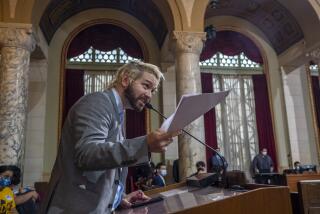No Conflict Because There’s Only One Client : Law: The city attorney can properly advise several municipal agencies at once, as it is doing in the Gates matter.
- Share via
The recent clash between the Los Angeles City Council and the Police Commission over the aborted attempt to place Police Chief Daryl Gates on administrative leave has provoked a number of questions about the role of the city attorney in interdepartmental conflicts.
Some have asked, “How could the city attorney advise the commission one day on the subject of administrative leave for the chief and, the next day, advise the council that it had the power to settle a lawsuit reinstating him?” “Why did the city attorney represent the City Council instead of the commission?” “Doesn’t the city attorney have an inherent conflict of interest?”
One commissioner claimed that the city attorney “is purporting . . . to represent both parties that have competing interests. . . . He has compromised the position of both his clients, in my opinion.”
This same claim is being made in the case now before the court.
Although the circumstances of this case are unusually dramatic, the issue of whom the city attorney represents is not new. It came up often during my term as city attorney. In 1978, I issued a memorandum that clarified the position of the office: “The civil branch of the Los Angeles city attorney’s office represents only one client, namely, the City of Los Angeles.” This analysis found, and continues to find, ample support in the law.
This precept is fundamental to understanding why the city attorney does not have a conflict of interest in advising various city departments that may sharply disagree with one another at any particular time. These departments are not separate legal entities but simply administrative arms of the city, a municipal corporation. Only that corporation is the city attorney’s client. Only that municipal corporation is a legal entity, able to sue or be sued.
Conflicts between city departments involving an interpretation of law have traditionally been resolved by the city attorney’s office. For example, in 1972, City Atty. Roger Arnebergh settled a jurisdictional dispute between the Department of Water and Power and the Department of Public Works over the distribution of reclaimed water. In 1975, I advised that the Department of Airports was not required to pay relocation assistance in amounts determined by the Board of Public Works. In 1982, City Atty. Ira Reiner resolved a conflict between the city controller and the Harbor Department regarding the propriety of certain entertainment expenses.
The city attorney is able to resolve these interdepartmental squabbles precisely because his client is the municipal corporation, not the individual officer or department involved.
Indeed, it would be unwise for city departments to have separate counsel. Aside from the 18 elected officials, Los Angeles has more than 30 separate departments or commissions. Internal conflicts occur on a daily basis. If each of these officials, departments and commissions had his or its own counsel, the cost would be astronomical. And the dependence of such attorneys on the appointing authority for their job security would compound the problem. They would invariably view themselves as advocates for their particular client’s viewpoint, thereby sacrificing the objectivity and impartiality of an elected city attorney. The authority of the city attorney to settle legal disputes among different arms of city government would also be lost.
The city’s reliance on an elected city attorney is sound. No structural changes are required. Of course, a conflict of interest may arise in a particular case from time to time that would disqualify the city attorney from acting, as in any law firm, whether public or private. While it is imperative that the city attorney be attentive to such potential conflicts, the conflicts do not, however, arise from the mere fact that two city departments are at odds.
The city attorney’s office bears a heavy responsibility because it is the only law office for the city. The real key to its effectiveness lies in its continued ability to deliver excellent legal services, without the distraction of interdepartmental partisanship, and with the credibility that flows from independence, objectivity and integrity.
More to Read
Sign up for Essential California
The most important California stories and recommendations in your inbox every morning.
You may occasionally receive promotional content from the Los Angeles Times.













